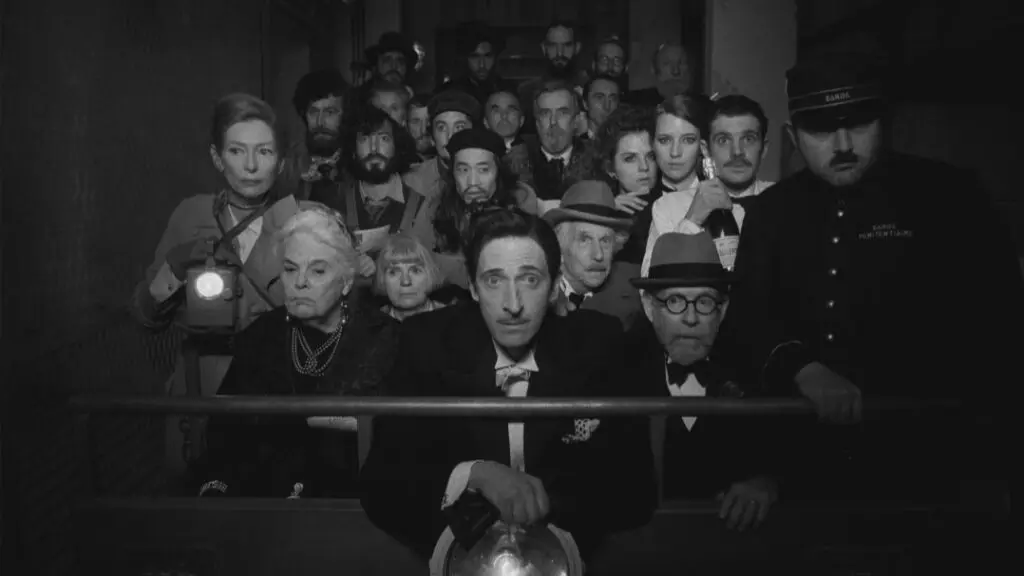Summary
The French Dispatch is pure Wes Anderson, but maybe his least accessible.
After watching his tenth feature film, The French Dispatch, I am 100% confident Wes Anderson was raised in a household with parents that performed a traveling festival of living pictures on weekends. How else would you explain the extreme attention to detail that rivals the anthropomorphic feline artist Louis Wain? It’s meticulously crafted to connect Easter eggs throughout the picture. It becomes immersive and a one-of-a-kind experience. However, all that artistic brilliance has the unintended consequence of making his latest perhaps his least accessible film to date.
The French Dispatch stars most of the Anderson players, with a few refreshing extras like Henry Winkler, Benecio Del Toro, and Timothée Chalamet (yes, in that order. The Fonz always takes precedence). The film’s subject is Bill Murray’s Arthur Howitzer Jr (kind of). The character is loosely based on the legendary editor of The New Yorker, Harold Ross. He shows a remarkable amount of allegiance and loyalty to keeping his writer’s stories intact. This, of course, makes him beloved by many.
The French Dispatch is an anthology of sorts. It recreates three stories. Howitzer is looking to publish. He takes his time. The hell with the ticking clock of when they need to get to press — the story needs to be cultivated. The first, titled The Concrete Masterpiece, is by far the best. Concrete has three art dealers (played by Adrian Brody, Bob Balaban, and Winkler). Two are past their prime, and the other is trying to reinvent the wheel. They want to mold a prisoner (Del Toro) into the new star of the modern art world. His muse is a correctional officer played by No Time to Die’s Léa Seydoux. It has never been about how good the art is. It has been about how you market the art.
The second part, Revisions to a Manifesto, is the least effective. Chalamet plays a young student named Zeffirelli. He is writing a manifesto and is groomed by Lucinda Krementz (Francis McDormand) in more ways than one. She’s an old maid and journalist who not covers the revolutionists but manipulates them. No matter how beloved Chamalet is by the young and old alike, this narrative begins to drag. It is often too self-involved for its good. The jokes tend to miss and not work here, no matter how high-brow the supporters make the argument.
The final story is by far Anderson’s most freewheeling and has the film’s best performance. Jeffrey Wright plays Roebuck Wright, an Anderson amalgamation of A.J. Liebling and James Baldwin. He delivers each line perfectly (“…allow me to play my mental bookmark”). Titled, The Private Dining Room of the Police Commissioner, it’s by far Anderson’s most freewheeling. That should be credited to his use of animation in a refreshing change of pace for him.
Overall, Anderson’s films become more self-involved with each passing attempt. The French Dispatch would have been a much stronger film if it focused on The Concrete Masterpiece as the central narrative. Adrian Brody’s slimy art dealer is one of his best performances in years. This would have been a much more interesting main character. It’s so good, and it made me wonder if Anderson pulled a Malick. You know, by leaving more of Julian Cadazio on the cut room floor.
One of my main complaints about Anderson is how precise the dialogue and language are in his scripts. This has grown into a problem in subsequent films since his masterpieces, Rushmore and The Royal Tenenbaums. While Quentin Tarrentino is praised for writing dialogue on how people talk, Anderson is at the end of the spectrum of Aaron Sorkin — people don’t speak this way. When Anderson’s household didn’t travel doing living pictures on those weekends, did they make up the most exact and exquisite grammatically correct dialogue while watching silent Charlie Chaplin films? Now that’s a theory.
Each film, like Dispatch, becomes even less emotionally connected for its audience. Those have qualities that are good and bad. You have a truly unique film that’s distinctive and finally crafted. On the other hand, the language and stories can be cold and unrelatable. Though so many movies nowadays are reproduced, cookie-cutter frauds. You can’t help but appreciate Wes Anderson’s The French Dispatch of the Liberty, Kansas Evening Sun.
I choose to go with the distinctive experience. Though, only mildly so.




